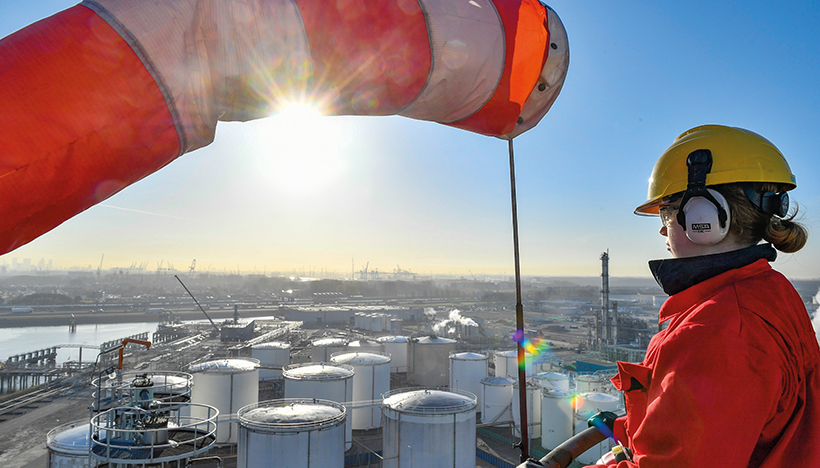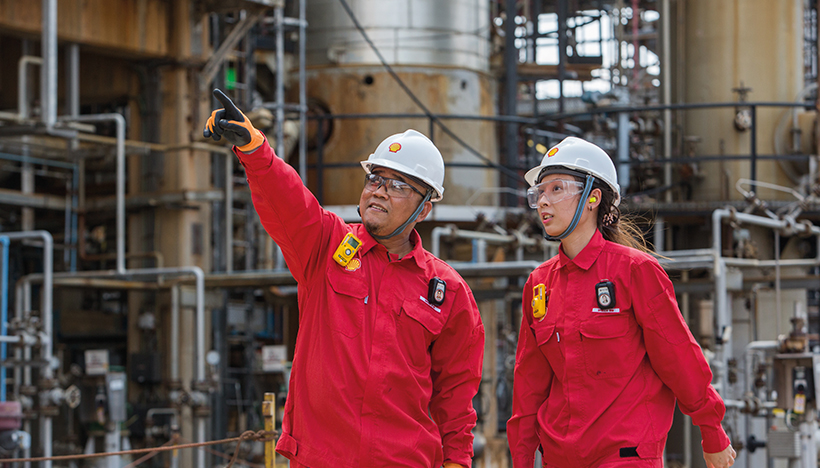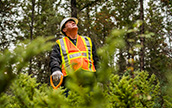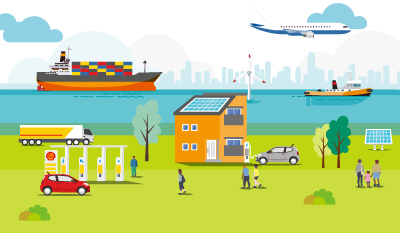Our organisation:
Delivering our Powering Progress strategy
Integrated gas, Renewables and energy Solutions
Integrated Gas manages liquefied natural gas (LNG) activities and the conversion of natural gas into gas-to-liquids (GTL) fuels and other products. It includes natural gas exploration and extraction, and the operation of upstream and midstream infrastructure necessary to deliver gas to market.
In Renewables and Energy Solutions (R&ES), we are exploring emerging opportunities and investing in those where we believe sufficient commercial value is available. R&ES includes Shell’s production and marketing of hydrogen, nature and environmental solutions as well as our integrated power activities.
Upstream
Upstream manages the exploration for and extraction of crude oil, natural gas and natural gas liquids. It also markets and transports oil and gas, and operates infrastructure necessary to deliver them to market.
While the Upstream business delivers the energy of today, it is also funding the energy of tomorrow and will play a fundamental role in supporting Shell’s ambitious transformation.
Downstream
Downstream manages different Oil Products and Chemicals activities as part of an integrated value chain that trades and refines crude oil and other feedstocks into a range of products which are moved and marketed around the world for domestic, industrial and transport use. The products we sell include gasoline, diesel, heating oil, aviation fuel, marine fuel, biofuel, lubricants, bitumen and sulphur. We also produce and sell petrochemicals for industrial use worldwide.
Our Downstream organisation also manages Oil Sands activities (the extraction of bitumen from mined oil sands and its conversion into synthetic crude oil).
Projects & Technology
Our Projects & Technology organisation manages the delivery of our major projects and drives research and innovation to develop new technology solutions. It provides technical services and technology capability for our Integrated Gas, Upstream and Downstream activities. It is also responsible for providing functional leadership across Shell in the areas of safety and environment, contracting and procurement, wells activities and greenhouse gas management.
Technology and innovation are essential to our efforts to meet the world’s energy needs in a competitive way. If we do not develop the right technology, do not have access to it or do not deploy it effectively, this could have a material adverse effect on the delivery of our strategy and our licence to operate (see “Risk factors”). Our Chief Technology Officer, who is part of the Projects & Technology organisation, oversees the development and deployment of new and differentiating technologies and innovations across Shell. Our main technology centres are in India, the Netherlands and the USA, with other centres in Brazil, China, Germany, Oman and Qatar. A strong patent portfolio underlies the technology that we employ in our various businesses.
Segmental reporting
Our reporting segments are Integrated Gas, Upstream, Oil Products, Chemicals and Corporate. Integrated Gas, Upstream, Oil Products and Chemicals include their respective elements of our Projects & Technology organisation. The Corporate segment comprises our holdings and treasury organisation, self-insurance activities, and headquarters and central functions. See Note 5 to the “Consolidated Financial Statements”. With effect from 2022, our reporting segments will change to Integrated Gas, Upstream, Marketing, Chemicals and Products, Renewables and Energy Solutions and Corporate, reflecting the way Shell reviews and assesses its performance.
Powering Progress: How we provide customers with the low-carbon products and services they want and need

Building one of Europe’s biggest biofuels facilities
Business customers in the harder-to-abate sectors of road freight and aviation are increasingly keen to cut their carbon emissions.
Shell and Deloitte’s Decarbonising Aviation: Cleared for Take-off report, published in September, found that 90% of aviation executives and experts interviewed said cutting emissions was one of their top priorities. The equivalent figure in the January 2021 report Decarbonising Road Freight: Getting into Gear was more than 70%.
Shell intends to supply our road freight and aviation customers with the low-carbon biofuels they want and need. An important aim of our Powering Progress strategy is to transform refineries into energy and chemicals parks so that we reduce our global production of traditional fuels by 55% by 2030.
At our Energy and Chemicals Park Rotterdam, in the Netherlands, for example, we are building one of Europe’s biggest biofuels facilities. It is expected to start production in 2024, making up to 820,000 tonnes of biofuels a year, which Shell will sell as sustainable aviation fuel and biodiesel.
The sales will help Shell make purposeful and profitable progress towards our target of becoming a net-zero emissions energy business by 2050, in step with society. The facility will help us achieve our ambition of producing around 2 million tonnes of sustainable aviation fuel a year by 2025.

Transforming our refineries into energy and chemicals parks
The multinational chemicals corporation Asahi Kasei, a Shell customer, is aiming to become carbon neutral by 2050 and to use more sustainable feedstocks in its supply chain.
We believe we can profitably supply Asahi Kasei and other customers with products that they want and need to achieve their carbon neutrality and sustainability aims. This will play an important part in transforming the Bukom manufacturing site into the Shell Energy and Chemicals Park Singapore, with an increasing focus on customers’ low-carbon energy and sustainability needs. In November, we signed an agreement to supply Asahi Kasei with butadiene, a chemical which it will use to make high-performance tyres that can cut vehicle emissions by improving fuel efficiency.
We plan to make the butadiene at Bukom, using a new unit that upgrades the quality of pyrolysis oil made from hard-to-recycle plastic waste that would otherwise go into landfill. We expect the pyrolysis oil upgrader to start production in 2023 and be the largest in Asia.
The pyrolysis oil it produces can be used to make chemicals that go into hundreds of everyday products, so Shell expects many other companies to become customers, especially those with sustainability goals. This will help Shell profitably achieve its aim of processing 1 million tonnes a year of plastic waste in our global chemicals plants by 2025. The transformation of Bukom and at least four other refining sites into energy and chemicals parks will help us achieve our ambition of reducing our global production of traditional fuels by 55% by 2030.









